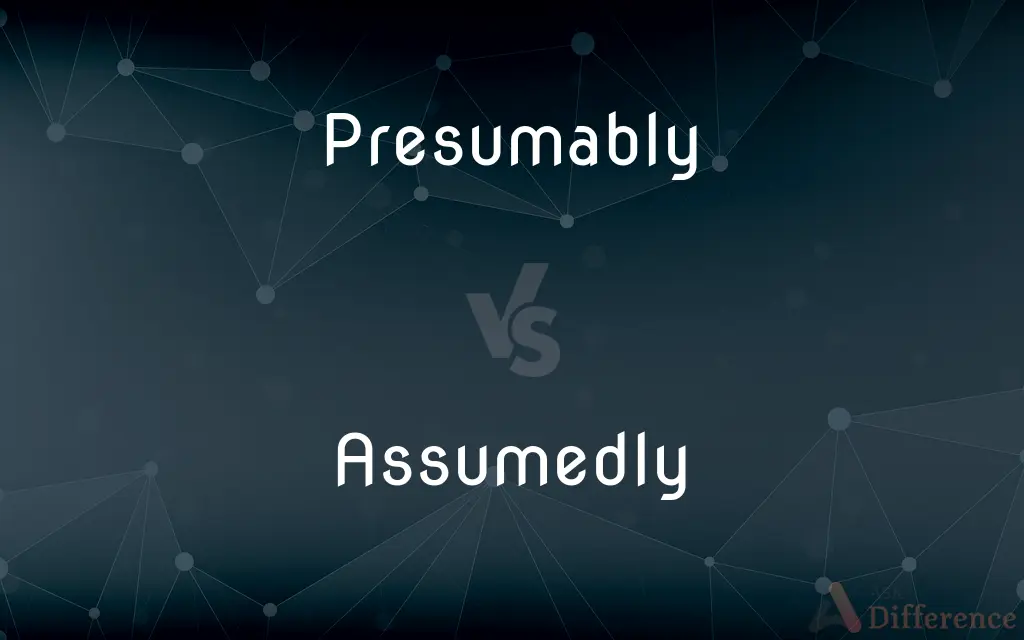Presumably vs. Assumedly — What's the Difference?
Edited by Tayyaba Rehman — By Maham Liaqat — Updated on April 22, 2024
Presumably indicates belief based on reasonable evidence or deduction, whereas assumedly suggests belief based solely on assumption, without evidence.

Difference Between Presumably and Assumedly
Table of Contents
ADVERTISEMENT
Key Differences
Presumably is used when there is some form of indirect evidence or logical reasoning that supports a belief or conclusion. For instance, if a meeting room is booked, one might say, "Presumably, the room is in use." This implies a logical deduction based on available information. On the other hand, assumedly is employed when a conclusion is reached without direct evidence or is based purely on supposition. It suggests a higher level of uncertainty or speculation than presumably.
Presumably often implies a higher degree of confidence compared to assumedly. It is used in contexts where the speaker believes the conclusion is likely true based on the given evidence or typical circumstances. For example, if someone is not answering their phone during work hours, one might say, "Presumably, they are busy with a client." Whereas assumedly does not convey the same level of confidence; it is used when the speaker is making an assumption without much or any evidence, as in, "Assumedly, he didn’t see the message."
In academic or formal writing, presumably is frequently preferred because it suggests that the conclusion is not only based on an assumption but also on some form of reasoning or evidence. This makes the argument or statement appear more credible and well-thought-out. Conversely, assumedly might be used in more casual or speculative contexts, where the basis of the statement is clearly recognized as an assumption rather than an informed conclusion.
While presumably relates closely to probability and likelihood, assumedly leans more towards possibility without the backing of evidence. This distinction is crucial in discussions where the degree of certainty needs to be communicated clearly. For example, in a weather forecast, a meteorologist might use presumably if patterns suggest likely rain, whereas assumedly would be less appropriate in such a scientifically grounded context.
Comparison Chart
Basis of Belief
Indirect evidence or logical deduction
Lack of evidence, purely assumption
ADVERTISEMENT
Implication of Certainty
Implies a reasonable level of certainty
Implies greater uncertainty or speculation
Usage in Speech
More confident, suggests likelihood
Less confident, suggests mere possibility
Preferred Contexts
Academic, professional, or well-reasoned arguments
Casual, speculative, or when evidence is absent
Example of Usage
"Presumably, the meeting has started."
"Assumedly, everyone agrees with the decision."
Compare with Definitions
Presumably
Suggesting something is likely true based on available evidence.
Presumably, she’s not attending due to her prior commitments.
Assumedly
Based purely on assumption.
Assumedly, everyone is aware of the changes.
Presumably
Expresses an assumption made under reasonable grounds.
Presumably, the conference will take place next spring.
Assumedly
Suggests taking for granted without proof.
Assumedly, the project will be completed on time.
Presumably
Used to convey that something is supposed without proof but based on probability.
Presumably, the library will be crowded during finals week.
Assumedly
Used when something is supposed without confirmation.
Assumedly, the meeting is at noon.
Presumably
Indicates belief inferred from circumstantial evidence.
Presumably, they’ve already left for the airport.
Assumedly
Indicates a guess or supposition.
Assumedly, he forgot to lock the door.
Presumably
Implies that the information follows logically from what is already known.
Presumably, traffic will be heavy during rush hour.
Assumedly
Reflects an assumption not grounded in evidence.
Assumedly, they’ll agree with our proposal.
Presumably
Capable of being presumed or taken for granted; reasonable as a supposition
Presumable causes of the disaster.
Assumedly
Taken up or used so as to deceive; pretended
An assumed name.
Presumably
Able to be sensibly presumed
Presumably, he will attend the opening.
Assumedly
Taken for granted; supposed
An assumed increase in population.
Presumably
In a presumable manner; by, or according to, presumption.
Assumedly
In an assumed manner; presumably.
Presumably
By reasonable assumption;
Presumably, he missed the train
Assumedly
By assumption.
Common Curiosities
Can assumedly be used in formal writing?
It's less advisable to use assumedly in formal writing because it implies speculation without evidence, which may undermine the credibility of an argument.
Is assumedly a common word in English?
Assumedly is less common and more informal, often used in casual or speculative discussions.
How can I correctly use presumably in a sentence?
Use presumably when your statement is based on reasonable evidence or logical deduction, for example, "Presumably, the store is closed at this hour due to the holiday."
What impact does using assumedly have on the listener or reader?
Using assumedly can signal to the listener or reader that the speaker is not entirely confident about the information, suggesting it is based more on personal assumption than fact.
How does the choice between presumably and assumedly affect the tone of a statement?
Choosing presumably over assumedly generally lends a more authoritative and confident tone to a statement, implying that the conclusion drawn is not just made up but has some basis.
What is an example of a situation where presumably would be inappropriate?
Presumably would be inappropriate in situations where there is no logical basis or indirect evidence to support an assumption, such as wild guesses or unfounded claims.
What are the risks of overusing assumedly in communications?
Overusing assumedly can make statements appear weak or unfounded, potentially leading to a perception of the speaker as less credible or knowledgeable.
How do presumably and assumedly differ in their implication of action?
Presumably can prompt actions based on the likelihood of something being true, whereas assumedly might caution against action due to its basis in uncertain assumption.
What type of evidence supports the use of presumably?
Presumably is supported by indirect evidence or logical reasoning that suggests a conclusion is likely true.
Does assumedly suggest any level of probability?
Assumedly does not suggest a specific level of probability; it merely indicates that a statement is an assumption without specific evidence.
Is there a preferred alternative to assumedly in formal discourse?
In formal discourse, it is better to use terms like "it is believed" or "one might assume" to convey assumptions, as these phrases suggest a more thoughtful consideration of possibilities.
When is it more effective to use presumably rather than assumedly?
It is more effective to use presumably when you want to convey confidence and the likelihood of being correct, based on evidence or common patterns.
Can the use of presumably be misleading?
Yes, if presumably is used without sufficient backing evidence, it can be misleading, suggesting a level of certainty that is not actually supported by facts.
What is a strategic context to use assumedly?
Assumedly can be strategically used when discussing hypothetical scenarios or when prefacing a statement that is more about personal belief than factual accuracy.
What can be done to clarify the use of assumedly in a statement?
To clarify the use of assumedly, it can be beneficial to accompany it with phrases that explicitly acknowledge the uncertainty, such as "this is just an assumption, but..." or "without evidence to the contrary, one might assume."
Share Your Discovery

Previous Comparison
Vise vs. Vice
Next Comparison
Duty vs. ResponsibilityAuthor Spotlight
Written by
Maham LiaqatEdited by
Tayyaba RehmanTayyaba Rehman is a distinguished writer, currently serving as a primary contributor to askdifference.com. As a researcher in semantics and etymology, Tayyaba's passion for the complexity of languages and their distinctions has found a perfect home on the platform. Tayyaba delves into the intricacies of language, distinguishing between commonly confused words and phrases, thereby providing clarity for readers worldwide.
















































